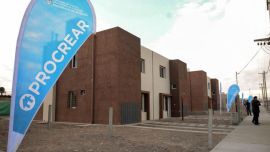A poll that circulated widely in political circles this week had a surprising number in it: only nine percent of the respondents said they had a positive image of Sergio Massa, the Renewal Front leader and one of a handful of politicians hoping to break through the polarisation between president Mauricio Macri and former president Cristina Fernández de Kirchner.
Non-Kirchnerite Peronists who were summoned to the Monday rally in the coast city of Mar del Plata had seen the poll too. The powwow was designed to be a sounding board for the group that calls itself “Federal Alternative,” which – at this phase of the electoral process – should be on the rise if it is to have any chance of a good shot at the presidency in October. As it turned out, it only debilitated Massa’s standing a tiny bit further.
Massa is mulling his second attempt on the presidency. The first was in 2015, the year Mauricio Macri was elected. Two years earlier, Massa had been arguably the top contender to succeed Cristina Fernández de Kirchner (2007-2015), after he bagged 44 percent of the vote in midterm elections in the province of Buenos Aires, beating CFK’s candidate Martín Insaurralde in the process.
His decision as mayor of the Greater Buenos Aires district of Tigre to lead a handful of peer mayors out of the ruling party, found a new party called Frente Renovador (“Renewal Front”), and defy and defeat the candidate of the Kirchner machine killed incipient efforts to push for a constitutional reform that might have catapulted Fernández de Kirchner to an unprecedented third term in office.
But while Massa did most of the dirty work in stopping the Kirchner era from eventual perpetuation, Macri ultimately reaped the benefits. The reasons why are multiple, but one stands out: Massa had served, if only briefly, as Cristina’s Cabinet Chief. He was and still is a Peronist, and he got trapped between two dead-ends: the Peronists did not hail him as the new leader, the non-Peronists seeking change thought he was too much of a Peronist to deliver it. In the 2015 presidential election, Massa got 21.4 percent of the votes, beginning a downward trend that continued in the senatorial race in Buenos Aires province of 2017, dropping to 11 percent.
This year’s race finds the Tigre strongman fighting for survival – again – just like the Tigre football club he commands politically, which is struggling to avoid relegation from the First Division. His stubborn commitment to a centrist position, one that is critical of both the Macri administration’s economic policies and the corrupt practices of the Kirchners might be proven to be wrong once and for all.
Massa is a plucky politician, but his tragedy is also the tip of the iceberg of a much larger historical problem for Argentina’s middle class: representation. Ask them in polls and most Argentines would identify themselves as middle class, even if they are on the highest or the lowest echelons of the social food chain. And still, middle-class economic interests as such hardly appear in political debate. Instead, the middle classes are pulled to either defend or rebuff the interests of other segments of society – that’s one reason why large chunks of middle-class voters are systematically dubbed ‘anti-Peronist,’ and more recently its most liberal urban factions would be considered ‘anti-Macri.’ Marxist sociology might call it false consciousness, but Marxist sociologists are a minority in the middle classes too.
Massa usually makes explicit appeals to middle-class voters and interests, most recently on topics such as jobs, inflation and utility rate hikes. Yet for some reasons the middle classes do not trust any of them. Psychoanalysts might call it transference – and there are a bunch of shrinks among the middle classes.
At the peak of his popularity, in 2013, some pundits compared Massa to the rising Venezuelan opposition politician Henrique Capriles, who twice ran for president and lost to the Hugo Chávez/ Nicolás Maduro regime. Capriles has also lost prominence over the years to new, more firebrand opponents such as Leopoldo López and more recently Juan Guaidó. Massa, on the contrary, seems to be leaving no legacy in his attempt for a third way in Argentine politics, and the ultimate question now is whether he will stick to his middle road or bend to the growing pressure to join the tide of polarisation and take his Frente Renovador back home to a Peronist unity ticket.
If he chooses not to, his call to build a new majority might simply end up becoming an old minority. And that football club, by the way, has hardly any chance of escaping relegation.






















Comments